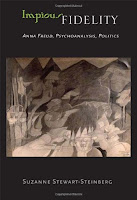Pages
▼
Impious Fidelity: Anna Freud, Psychoanalysis, Politics
In Impious Fidelity, Suzanne Stewart-Steinberg investigates the legacy of Anna Freud at the intersection between psychoanalysis as a mode of thinking and theorizing and its existence as a political entity. Stewart-Steinberg argues that because Anna Freud inherited and guided her father's psychoanalytic project as an institution, analysis of her thought is critical to our understanding of the relationship between the psychoanalytic and the political. This is particularly the case given that many psychoanalysts and historians of psychiatry charge that Anna Freud's emphasis on defending the supremacy of the ego against unconscious drives betrayed her father's work.
Are the unconscious and the psychoanalytic project itself at odds with the stable ego deemed necessary to a democratic politics? Hannah Arendt famously (and influentially) argued that they are. But Stewart-Steinberg maintains that Anna Freud's critics (particularly disciples of Melanie Klein) have simplified her thought and misconstrued her legacy. Stewart-Steinberg looks at Anna Freud's work with wartime orphans, seeing that they developed subjectivity not by vertical (through the father) but by lateral, social ties. This led Anna Freud to revise her father's emphasis on Oedipal sexuality and to posit a revision of psychoanalysis that renders it compatible with democratic theory and practice. Stewart-Steinberg gives us an Anna Freud who "betrays" the father even as she protects his legacy and continues his work in a new key.

